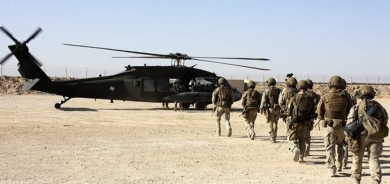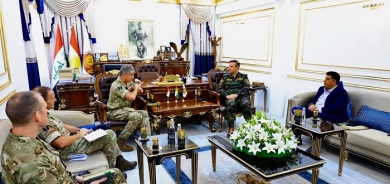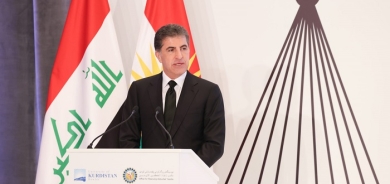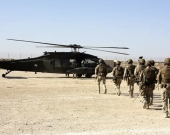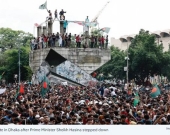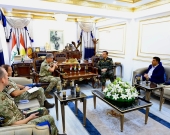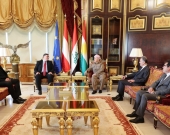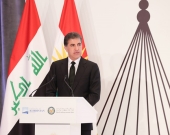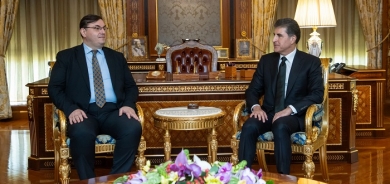US Defense chief Carter : ‘The Kurds do really fight’

WASHINGTON, DC— The two top US defense officials praised Kurdish forces in an otherwise bleak picture of the situation in Iraq during tough questioning Wednesday before the House Armed Services Committee.
Secretary of Defense Ashton Carter and Joint Chiefs of Staff Chair General Martin Dempsey maintained the White House line of supporting a unified Iraq led by Prime Minister Haider al-Abadi, but the feasibility of that plan came under heavy fire from members of the US Congress.
Washington representative Adam Smith, the top Democrat on the panel, said the officials’ concern of a fractured Iraq was understandable, but wondered if the time to fix the war-torn country may have already run out.
“I’ve said many times before, that cow has left the barn. Iraq is fractured. You can make a pretty powerful argument, in fact, that Iraq is no more,” Smith said.
Like other members of the panel, Smith pressed the defense officials to explain the next phase of the strategy put in place by the administration of President Barack Obama.
“When do we shift that strategy and start building the capabilities of other who will fight?” Smith said, referring to the Obama policy of Iraqis fixing the country by themselves.
One bright spot in the testimony, according to a number of participants, was the performance of Kurdish forces.
“The Kurdish strategy seems to be the one that is working in almost anyone’s mind in being very effective,” said Trent Franks, a Republican representative from Arizona.
Carter went further, calling the Kurds “committed and capable.”
“[T]he Kurdish forces are what we aspire to with respect to Iraqi security forces in general. They showed the will to fight, they showed the capability to fight. These guys [Kurds] do really fight,” he said.
Carter said Washington’s commitment to the Kurdistan Regional Government was still in place despite a move by the Senate this week to block direct arming of Kurdish forces.
“We are supporting them from the air, we are supporting them with equipment,” he said.
Carter explained the move Obama administration’s strong preference for weapons to be dispersed through Baghdad as a means to “build and foster a multi-sectarian Iraqi state.”
“But we have told Baghdad, you can't slow this down,” said Carter, referring to weapons deliveries to Kurdish forces.
He conceded that Baghdad had hindered delivery of equipment to the Kurds in the past.
“They were slowing down in the earlier days.”
Carter said he went through a list of weapons provided to Kurdish forces with Masoud Barzani when the Kurdish president was in Washington earlier this year.
Hawaii Democrat Tulsi Gabbard pointed out that the US had invested thousands of lives and billions of dollars without doing much to bridge Iraq’s ethno-sectarian divisions.
“Despite the rhetoric by Prime Minister Abadi, the reality is, for practical purposes, you have three regions in Iraq. It’s a fractured country: the Kurds in the north, the Shiites have their stronghold in Baghdad, essentially, and you have Sunni territories largely to the west,” said
Gabbard.
Gabbard argued that the sectarian nature of Abadi’s government had pushed many Iraqi Sunnis to join the ranks of ISIS. She cast doubt on Washington’s relationship with Baghdad.
“I just continue to encourage the administration to change its policy on supporting this government in Baghdad. I would argue that this government in Baghdad is further adding fuel to the fire of sectarianism by allowing these Shiite militias, by allowing this sectarian persecution to continue which further allows further oxygen to ISIS to continue to exist and continue to grow in Sunni territories,” Gabbard said.
Gabbard added: “When Tikrit was taken, Sunni families were terrorized by Shi'ite militia, homes were burnt down, businesses were looted and in result you see why these Sunni people have no motivation to go and fight [ISIS].”
According to Carter, however, the violations in Tikrit occurred because the forces leading the operation were not under the control of the Iraqi government.
“Tikrit was not what we tried to achieve. That was not an ordered operations under the exclusive control of the Iraqi government. If you put Shiites in Sunni areas, you know how that ends,” he said.
Carter said empowering the Sunni population is an important factor, but the minority had real concerns about the future.
“This is not a simple environment,” Dempsey said, “The reality is some of our Sunnis partners both outside of Iraq and inside are more worried about Shiite and Iranian hegemony than they are about ISIL.”
The Pentagon chief said the Iraqi army is dominated by Shiite, which has alienated potential Sunni recruits.
“Iraqi security forces have increasingly become a Shiite force rather than a Sunni force, which is precisely why the Sunni people of Iraq did not feel like they were protecting them and it was not their army,” Carter said.
Congressman James Langevin, a Democrat from Rhode Island, questioned if the US is seeking to “artificially” uphold the territorial integrity of Iraq when its people want a different solution.
“Are we trying to artificially hold together an Iraq that does not want to be held together? Are we asking our men and women in uniform to go into a situation and put themselves in harm’s way for an artificial effort to hold that country together?” Langevin asked.
Wouldn't we be better off focusing on another strategy that has is more realistic about what the local people want?”
Rudaw


